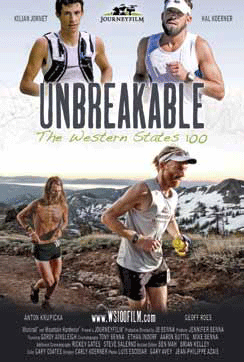 Our reviews are 100% organic. We do not accept payment for reviews or bundle with advertising budgets. In most cases, the brand is providing the product to our reviewers free of charge.
Our reviews are 100% organic. We do not accept payment for reviews or bundle with advertising budgets. In most cases, the brand is providing the product to our reviewers free of charge. Unbreakable: The Western States 100, a film released in December by JourneyFilm, tells the story of the 2010 Western States, which featured a highly anticipated battle between four of the best ultrarunners in the world. The main characters are Kilian Jornet, of Spain, who had never been beaten in an ultra, Anton Krupicka, of Colorado, who had never been beaten in an ultra he finished (he did suffer a couple of dnfs), Geoff Roes, of Alaska, who had never been beaten in a 100-miler, and Hal Koerner, of Oregon, who had won the previous two Western States.
Filmmaker JB Benna, himself a Western States finisher, assembled a large cadre of running cinematographers, including elite runner Rickey Gates and Benna’s wife Jennifer (also a fine ultrarunner). Having filmed the race twice before, Benna knew that showing the rugged and almost inaccessible trail portions would be difficult to accomplish, but was essential to showing the drama of the race and to get the uninitiated familiar with the travails of running 100 miles across the mountains. He captured several outstanding sequences, notably one that shows the runners slipping and sliding through the snow in the high country, and another in Deadwood Canyon showing a gazelle-like surge by Jornet. Running at sub-seven-minute pace on a rough trail carrying a 10-pound camera is no mean feat. Benna estimates he ran 34 miles during the race.
The film seamlessly weaves the backstory of the four runners in their home environments into the race, and gives you a true sense of the difficulty of being an elite ultrarunner. We see Roes, who works as a cook at a natural foods store, camping near the start of the race, eating pasta cooked over a camp stove in a tin pot. It’s impossible to fathom an elite athlete in almost any other sport going through this the night before a major competition.
We are also let into the life of the others. Krupicka is a graduate student, and we see him at home in Colorado, running effortlessly up a long hill at altitude. Koerner is the owner of a specialty running shop in Oregon and we visit him in the weeks before the race, nursing an injury and fretting over its impact. He is anxious, too, for his fiancée, Carly, who is also running Western States. Jornet is shown in footage in the Pyrenees and on Mount Kilimanjaro (filmed after the Western States race), discussing the impact his mountain-guide parents had on his approach to life. Fortunately for the viewer, all are interesting and often evocative subjects.
The only “miss” in the film is the lengthy interview with Gordy Ainsleigh, the runner who first traversed the 100-mile trail in 1974. When similarly interviewed in the 2001 film Race for the Soul, Ainsleigh came across as a pioneer and a visionary, succinctly relating the struggle, the despair, the effort and the joy of accomplishing the seemingly impossible. In Unbreakable, Ainsleigh recounts his original run in a somewhat rambling fashion, while standing shirtless on the trail, and comes across a bit too much like the crazy old uncle you try to keep away from polite company. But even this is completely forgiven when the film shows Ainsleigh, now 63, shuffling the last mile up from Robie Point, despite it being more than an hour over the race’s 30- hour time limit.
The race itself unfolds in high drama, an intense battle among four stellar athletes. Koerner trails by a few minutes for the first half, with the other three shoulder-to-shoulder. Benna is there when Roes shows the first crack in the armor, on the difficult climb up to Devils Thumb. The cameras are also there much later, when Jornet nearly collapses coming into Green Gate aid station and Krupicka takes the lead. We also see Roes coming into the same spot a few minutes later, now with fire in his eyes, his entire demeanor completely different from when we last saw him some 35 miles earlier. The tension is palpable – and expertly captured.
Finally, we are at the finish line on the track at Placer High School, seeing what can only be described as the joy of victory. I’ve watched the film several times. Despite what would seem to be a lack of drama (hey, I was there, I already know what happens) this scene packs a huge emotional wallop every time, a true sign of fine filmmaking.
For non-runners, there is enough character development and backstory to develop a rooting interest, and the film does an excellent job of showing what ultrarunning is all about. (The only thing that’s missing is the numinous experience of running through the night; Koerner dropped out at mile 80 and the other three finished before dark.)
For the ultrarunner, many parts of the film are pure poetry. Benna has captured the drama of the event, the feel of the trail, and the intensity of the competition like no one has ever done before. Unbreakable is quite possibly the best running movie ever made, and certainly the best movie about ultrarunning.
Unbreakable: The Western States 100, a film by JB Benna. Running time 105 minutes. Available at www.journeyfilm.com.

